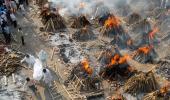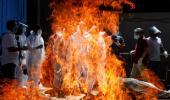The Supreme Court on Monday asked the Centre that it may consider tweaking the protocols for the burial of bodies of COVID-19 victims in a way that essential tenets of the Zoroastrian belief are also taken care of.

A bench of Justices DY Chandrachud and Surya Kant suggested that an informal virtual meeting of senior advocate Fali S Nariman and Central government officials and solicitor general Tushar Mehta can take place and suggestions can be put across and protocols can be tweaked.
“The petitioners (Parsi community board) have suggested a protocol. You can see from the protocol that if any things need to be added then additional safeguards can be put and take into account the concerns of the community”, the bench said.
It added that the Centre has a genuine concern on account of public health and public well-being but let there be an exchange of ideas and explore if anything could be found moving forward.
“If you can look at the protocol and make some changes to the protocol and share it with Mr. Nariman. You can also convene a virtual meeting of the concerned officials of the ministry of health and family welfare. See to what extent the protocol can be tweaked. The broad theme is allowing religious observances to be completed”, the bench told Mehta.
The solicitor general said that he has filed the affidavit pointing out that it may not be scientifically possible.
Nariman submitted, "We are strictly on the dignity of the dead in the disposal of bodies along with the guidelines of the Union government. We have all the safeguards that they are providing”, he said.
Mehta said that it is not an adversarial matter and he is only on the problem, which his affidavit had stated.
The Centre in its affidavit said that the ministry of health and family welfare, in consultation with Indian Council for Medical Research, has issued guidelines for the disposal of dead bodies of COVID positive persons.
“The basic element of these guidelines is that the dead body will be fully covered and not exposed so that people who are handling the dead body, which may or may not include family members, must not come in contact with bodily fluids or secretions. Coronavirus, according to scientific evidence that has emerged so far, can survive on a dead body, in bodily fluids, secretions, and moist cells of the dead body for up to nine days”, it said.
The government said that a dead body will be considered as an inanimate surface and secretions from orifices will carry infected cells and will remain smeared on the body surfaces after death.
“It is thereby submitted that appropriate handling of dead bodies of COVID positive patients, therefore, remains critical from a public health perspective”, it said, adding that as per clinical evidences emerged so far, the main driver of transmission or infection of COVID-19 is through the respiratory route.
It said that the World Health Organisation, in its interim guidance dated September 4, 2020, on infection prevention and control for the safe management of a dead body in the context of COVID-19, has noted that if the person died of COVID-19 while he or she was infectious, the lungs and other organs may still contain live virus even after death.
“The guidance by the WHO also makes recommendations for the disposal of dead bodies of COVID-19 patients by cremation or burial alone”, it said, that the dead bodies of such infectious patients are likely to get exposed to the environment and animals, if not buried or cremated properly.
It said, “In view of the aforesaid concerns, keeping the dead body exposed (without cover) without burial or cremation will not be a permissible way of disposal of dead bodies of Covid positive patients”.
In its plea, the Surat Parsi Panchayat Board had sought to protect the fundamental right to perform the last rites of the community members, who died of Covid, in accordance with the tradition of Dokhamanshini and not cremation, as has been directed by the authorities in view of the pandemic.
In the Dokhamanshini tradition, the body is kept at a height on a structure referred to as a well or the tower of silence, to be eaten by vultures, and the remains are left to decompose under the sun, it was stated.
On January 10, the top court had sought the assistance of the Solicitor General to find an amicable solution in resolving the grievances of the Parsi community, which is unable to perform the traditional burial of its members who died of COVID-19.
Nariman, appearing for the Surat Parsi Panchayat Board, said the Parsi community is the only community in the country that has professional pallbearers and the existing guidelines do not allow for burial as is done in the community.
There is a community of corpse bearers among the Parsis, he had said, adding that when someone dies, the family members do not touch the body and only the corpse bearers can do so.
The appeal filed by the Surat Parsi Panchayat Board has challenged a July 23, last year order of the Gujarat high court, dismissing its plea that sought permission to perform the last rites of the community members, who died of COVID-19, in accordance with the Zoroastrian traditions, instead of cremating them.
The petition before the high court had stated that the Parsi community was compelled by the authorities to opt for cremation or burial of its deceased members, "as against its religious practice and sentiments".











 © 2025
© 2025